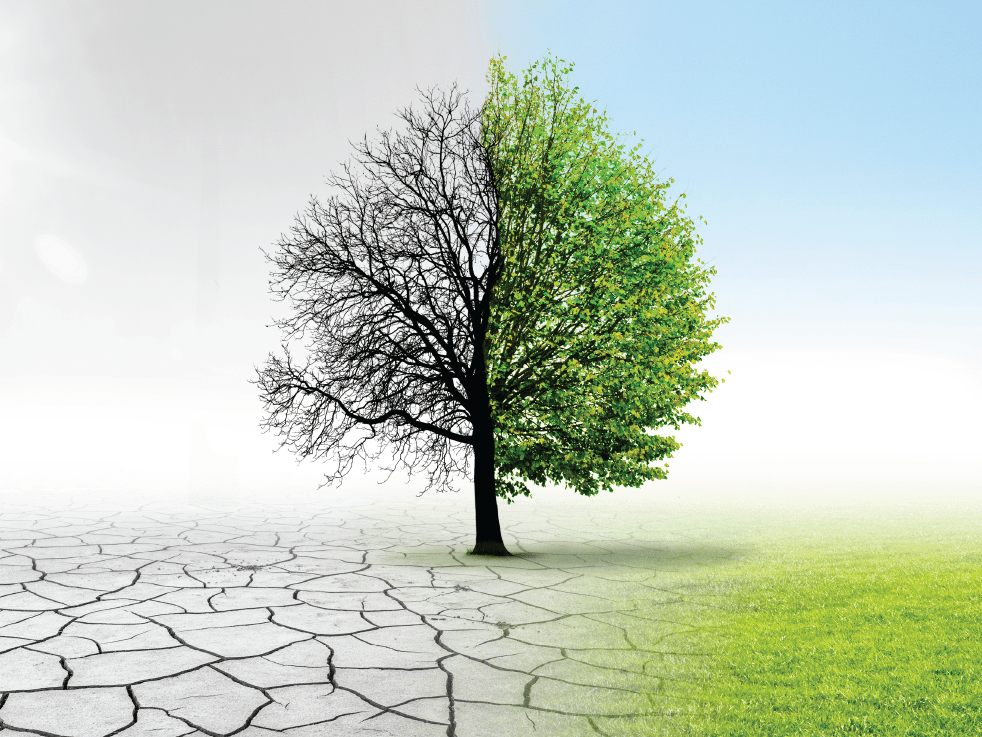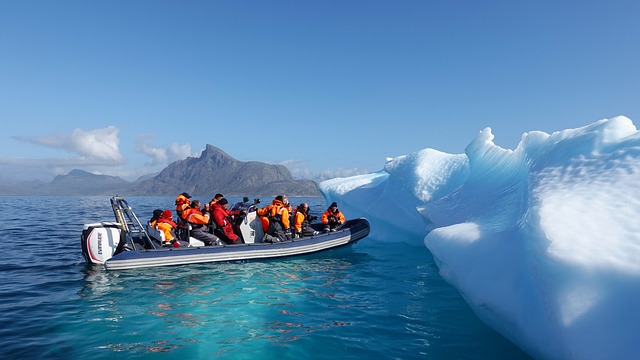
Global climate change has serious implications for all living things on Earth. Scientists have studied the impacts of this phenomenon in numerous ways. The impacts range from changing the weather patterns to the reduction of biological diversity. It is essential that governments take steps to mitigate the effects of this trend.

A bibliometric study was done to give a comprehensive overview of global climate research. It compares different regions and countries' scientific output to identify the most critical aspects of the issue. For this purpose, a database of 40,062 articles on climate change were evaluated. These articles were pulled from the World of Science Database. This comprehensive assessment of state-of-the art was possible by analyzing publications that are based on socioeconomic, technological and ecological factors.
Researchers have observed that ocean heat has increased in recent decades. Additionally, the Arctic heats up at twice the rate of the rest. Consequently, sea levels are rising at a rapid rate. The most affected by the adverse effects are cities and coastal ecosystems that are the biggest in the world.
Scientists have examined a variety of factors that influence the Earth's energy balance. However, scientists also use sophisticated models to predict the future climate. These models show that the developing world faces a huge burden from climate impacts. However, these models are not able to reproduce what has actually happened. Hence, reliable estimation of the changes caused by climate change is the heart of research.
Although scientists have found a lot of evidence to support global warming, it is still difficult to project the actual effect of this phenomenon. All mitigation strategies should be built on reliable estimates of the potential impacts of climate changes. To do this, the Global Climate Risk Index provides data on the severity of weather incidents in various years.

Another indicator of global warming is the rapid increase in greenhouse gas concentrations. The rate of rise has been unprecedentedly high over the past century, according to research. This is because human activities have increased the amount of CO2 in the atmosphere. Therefore, these gases trap more of the Sun's heat. Research shows that the rate at which the Sun's heat is warming over the past century has been 10 times faster than that of the past decade.
The melting of ice sheets, and the increase in heat in oceans are other indicators that the earth is going through rapid changes. These changes can have a catastrophic effect on human life including water supply and food. Climate change is already causing extreme weather events to increase. Despite numerous warning signs of a changing climate and the need to act, governments are yet to do anything to address its effects.
FAQ
How does climate change politics impact global efforts?
Climate change is a controversial issue that has caused a lot of division between nations, governments and individuals. The political stances taken by different actors will impact the implementation measures to combat climate changes. It is becoming difficult to reach consensus on global efforts for addressing this urgent environmental crisis.
Most scientists agree that humans are causing climate change. This is why it is urgent to act. These issues are often subject to political interference that can hamper global cooperation in order to implement sustainable energy practices, preserve natural habitats, find viable technological solutions and other interventions related to climate change.
Many governments in the world want to protect their economic interests, and enforce measures that limit business activities. This often conflicts with the regulations that experts recommend to address climate change efficiently. Without strong commitments from all participating countries and wide-scale international action, it becomes very difficult for any single state or group of states to adequately address climate change through legislation or otherwise.
It is difficult to reach a consensus about how to address climate change because of differences in power dynamics between countries. Countries with more economic power frequently appoint their own representatives for international negotiations over the environment. This can lead lopsided discussions between countries' perceived interests and those of all other parties. The potential side effects of radical change like geoengineering, have been extensively discussed at both the national level and internationally.
Also at the grassroots level, grassroots movements have fought against powerful opponents such as corporate ownerships. These lobbies are trying to preserve politically favorable positions for their industry especially when it is about funding research into alternative sources of energy production or enforcing Renewable Energy Technology mandates. If individual governments want to make valid progress in the subject matter themselves instead of seeking short-term benefits or spectacles, they must be clearheaded about possible outcomes.
If we are to achieve a coordinated effort to address our current environmental crisis, it is crucial to properly distribute resources and be aware of political divisions among nations.
What is the role of greenhouse gases in climate change?
Greenhouse gases are a key factor in climate change. They act as an invisible layer around the Earth trapping infrared radiation. This warms the atmosphere. Without them, our planet would be much cooler than it is now.
Human activity is responsible for the emission of greenhouse gases. This includes burning fossil fuels and other industries. These activities are increasing in number, which means that more heat is trapped in our atmosphere. This can lead to extreme weather events and rising temperatures.
Carbon dioxide (CO2) is the largest greenhouse gas. This is due to fossil fuels like oil, coal, and gas. Methane (CH4), nitrous oxide (N2O), and fluorinated gases (F-gases) are also major contributors to climate change.
Since preindustrial times, the concentration of greenhouse gases has risen significantly due to human activity. This has led worldwide warming and increased temperatures in the oceans as well as all over the planet. It's also causing changes like more severe storms and droughts as well as melting glaciers and rising sea level.
To prevent further climate change-related damage, humanity must reduce its greenhouse gas emissions by moving away from fossil fuels and towards renewable energy sources like wind or solar power. There are also ways to reduce CO2 emissions, such as by planting trees and using agricultural techniques that absorb more of the gas. These actions will reduce the atmospheric concentrations and improve the environment for all living things on Earth.
What role does the energy sector play in climate change? How can this be addressed?
The energy sector is a major contributor to climate change. The burning of fossil fuels is a primary source of global warming, caused by releasing carbon dioxide into the atmosphere, trapping heat, and leading to an increase in average temperatures on Earth.
To address this, energy sources must move away from carbon-emitting sources, such as coal and natural gas, and instead transition towards renewable energy sources like solar, wind, and geothermal. This shift can be made possible by both government policy and incentives as well investments in innovative technology like hydrogen-fuel cells. By investing in infrastructure that supports the use of these renewable sources, businesses and households can drive down emissions while simultaneously reducing their electricity bills.
Another option is to move away from polluting transport options such as petroleum-fueled vehicles and towards electric cars or public transport. The government has great power to help societies transition away from oil-based infrastructures. They can support research into battery technology and encourage consumers to invest in cleaner modes.
To reduce carbon footprints, companies should adopt green business practices. For example, better insulation in offices and production facilities. This can reduce operational costs dramatically while improving environmental performance metrics.
These initiatives must be championed not just at the company level but also at the government level for them to be truly effective; increasing taxes on pollution products encourages individuals to switch away from harmful practices without forcing them financially outcompeting polluters by providing vouchers or subsidies for low-carbon products will create an ongoing market to support sustainability efforts moving forward. This is why tackling climate changes requires both private industry as well as private citizens to make a difference. By switching to green energy and adopting environmentally friendly practices, we can help to ensure that the future generations of people are affected positively.
What are the possibilities for new technologies to combat climate change?
The potential of new technologies to address this global challenge is vast. We can now transition to a more sustainable tomorrow by utilizing renewable energy sources such as solar, wind and geothermal, as well energy storage systems like thermal tanks or battery packs.
To reduce greenhouse gas emissions, new methods of carbon capture can be used. Enhanced agricultural practices can also help to reduce the amount of livestock and soil degradation. Smart grid technology can be integrated with existing power infrastructures to improve efficiency. Enhanced building design can help reduce energy consumption.
The latest synthetic biology methods allow scientists to create organisms that can use green sources of fuel like the CO2 laser as biofuels or alternative feedstocks. This could change the way that transportation is done if petrol-based vehicles are replaced by zero emission electric cars that are powered from clean sources.
Finally, increasing investment in digital tech and AI can enable people to access data across borders and help them make more informed consumption decisions. Understanding how we contribute to the carbon production of our planet is key for better stewardship.
Statistics
- features Earth's average surface temperature in 2022 tied with 2015 as the fifth warmest on record, according to an analysis by NASA. (climate.nasa.gov)
- This source accounts for about 10% of all the water that enters this highly productive farmland, including rivers and rain. (climate.nasa.gov)
- Indigenous peoples and local communities receive less than 1% of all climate funding despite scoring wins for people and nature Africa's broken food markets must be fixed to tackle hunger (climatechangenews.com)
- features Earth's average surface temperature in 2022 tied with 2015 as the fifth warmest on record, according to an analysis by NASA. (climate.nasa.gov)
- Fossil fuel production must decline by roughly 6 percent per year between 2020 and 2030. (un.org)
External Links
How To
How to educate your community about climate change and mobilize action
There are many ways to learn about climate change education, including online resources and interactive tools, classroom activities, simulations and experiential learning programs. These are the essential elements of effective climate education:
-
People are equipped with practical knowledge
-
demonstrating ways that individuals can make a difference
-
Involving participants in an open dialog about potential solutions
-
Shared experiences inspire action
Teachers can help communities to reduce their environmental footprints by offering comprehensive lessons in climate change for both adults and students.
It is also possible to connect scientific research with real-world examples, which can be a unique way of engaging audiences in meaningful dialogue. The best practices and case studies can provide participants with the chance to experience positive outcomes firsthand. This can help them innovate or create replicable measures in their own communities.
Participants will be able to use their mental skills, such as petition-writing, campaign creation, or local action, to help them become social and political agents or sustainably improvement advocates. Individual agency is important because it highlights the importance to reduce emissions. Participants can also be shown how they contribute collectively towards a better outcome. Additionally, involving stakeholders early on in policy-making efforts encourages active engagement in decision-making processes allowing them to become involved at all stages of the process which could result in more equitable outcomes for all parties affected by the policy design decisions. If we work together to improve public understanding and to take the appropriate action to reduce greenhouse gases emissions, then we might be in a position to create an environment that allows us to address urgent issues with our attention being focused where it is most necessary. In this way, we can all help to achieve our collective goals.